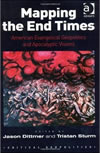Introducing Jason Dittmer
 Jason Dittmer (USA) received his BA in Political Science and International Studies from Jacksonville University (1998), an MA in International Affairs from Florida State University (1999), and a PhD in Geography from Florida State University (2003). Presently he is Lecturer in Human Geography at University College London.
Jason Dittmer (USA) received his BA in Political Science and International Studies from Jacksonville University (1998), an MA in International Affairs from Florida State University (1999), and a PhD in Geography from Florida State University (2003). Presently he is Lecturer in Human Geography at University College London.
His main reserach interests are critical geopolitics, geographies of media, especially comic books; religion and (geo)politics; and poststructuralist approaches to diplomacy.
Geopolitical Passport
Your relationship with geopolitics
At what age did you discover geopolitics and what attracted you to it?
Rather embarrassingly, I am a latecomer to geopolitics. I studied international relations as an undergraduate and stumbled into geography rather late although I had taken geography classes periodically throughout my higher education. Consequently, my PhD is my only degree in geography. I waffled for a while on my dissertation topic, and eventually started working on representations of place in newspaper coverage of the processes of NATO and EU expansion that were unfolding at that time. At some point I was stumbled across the critical geopolitics literature and I distinctly remember being excited that there was a name for what I was doing. It linked my longstanding interests in international relations with the excitement of poststructuralist thought, which was new to me.
Which geopolitical topics have your focus and why did you choose especially these?
I have generally focused on the relationship between media and geopolitical imaginations, and this has taken me in a variety of directions. I sometimes return to interests in news media when a topic interests me. Recently I studied news coverage of the Mars Pathfinder mission and also I (with co-author Dave Parr) compared the news coverage of the conflict in Kosovo with that in South Ossetia.
A second research strand has revolved around the study of nationalist superhero comic books, a topic on which I am completing a book at the moment.
A third strand of research has developed around evangelical end-times novels and the ways in which readers of these novels assimilate these books with other sources of information about the geopolitical world, such as the Bible and more traditional news media. In general I have become increasingly interested in the everyday practices of cultural consumption (and production) through which people ‘produce’ geopolitics. I have worked on this agenda in part out of a concern with showing the relevance of geopolitics to everyday lives (and vice versa) and also with emphasizing the agency of everyday people in the geopolitical world.
What do you consider your most important contribution to geopolitics?
I think my most important contribution to geopolitics is my teaching; my hope is that students find my classes on political geography and geopolitics to be transformative and that they go forth into the world and change it in millions of small ways for the better.
As far as my written work goes, I seem to be known for my work on nationalist superheroes (especially Captain America) more than anything else. At least that seems to be true given the deluge of emails I get whenever something superhero-related hits the news. And I hear from some instructors that they find the Captain America work useful in the classroom. Nothing makes me happier.
My geopolitical preferences
What is your favourite definition of geopolitics?
I like George Friedman’s “There are those who say that perception is reality. Geopolitics teaches the exact opposite: There is a fundamental reality to national power, and the passing passions of the public have only a transitory effect on things.” I don’t like it because I think it’s right, but I like it because it provides a jumping off point for the interrogation of the geopolitical.
Which geopolitical scientist do you admire the most?
Oh dear. This is a tricky one to say because it’s hard not to come across like a complete sycophant. But I’ll just be upfront and say that the two people who I find to be doing the most interesting work at the moment are Jennifer Hyndman and Fraser Macdonald. I look forward to reading whatever they publish because it’s always challenging to what I take for granted in geopolitics.
What is your favourite geopolitical book?
Another tricky one. I think I’ll go with David Campbell’s “Writing Security: United States Foreign Policy and the Politics of Identity.” When I read that book in graduate school it was like a bomb went off in my head, and everything I thought I knew was called into question. Glorious.
What is your favourite geopolitical website?
I’m going to say Facebook – I have a very politically/geographically diverse group of friends and it’s a never-ending experiment in popular geopolitics to watch my news feed as geopolitical events unfold.
The geopolitical future
In what direction(s) will geopolitical science be heading the coming decades?
Well, I hope it doesn’t go in the direction of ‘science’ – I think it ought to be running in the opposite direction. There seems to be a tension between scholars of geopolitics, who by a wide margin reject the notion of geopolitics as a science, and pundits who parachute in, grab the bits of geopolitical history that they like and run to the presses with it. I’m thinking in particular of the recent kerfuffle over Robert Kaplan’s “The Revenge of Geography”. Those who want to take the discourse of geopolitics and use it to make policy will continue to make hay with it unless we continue to shout them down, over and over again.
Which geopolitical subject has been too little in the spotlight and needs further research?
I think we ought to be trying to direct more attention to the ways in which everyday practices constitute geopolitics. Martin Müller’s 2008 paper in Political Geography quite rightly calls the geopolitics community out for over-focussing on elites. Even in popular geopolitics, the part of geopolitics supposedly concerned with everyday life, we were looking at media elites and their products, rather than what people do with those products.
More and more work is starting to upend that paradigm. I’m thinking in particular of work in feminist geopolitics, but others are also doing good work in this area, like Nick Megoran’s ethnographic work. I think that connecting geopolitics and the everyday is the future.
What will be the largest geopolitical challenge for the world in the 21st century?
I try not to think in terms of ‘the world’. Most of the time framing a question that way leads to the extrapolation of a white, Western subjectivity into a purportedly global consciousness. I would also prefer to think in terms of opportunities rather than challenges. All this makes it hard to answer the question, but I’ll offer a humble reply: do better.

